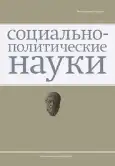Dimension of Political Science in Russian Identity of the Past and Present
- Authors: Asonov N.V.1
-
Affiliations:
- Moscow State Pedagogical University
- Issue: Vol 13, No 4 (2023)
- Pages: 27-36
- Section: History and Theory of Politics
- URL: https://journals.eco-vector.com/2223-0092/article/view/582725
- DOI: https://doi.org/10.33693/2223-0092-2023-13-4-27-36
- ID: 582725
Cite item
Abstract
Based on the specificity of political science, which requires placing power as the central category of politics and the political system when analyzing various social phenomena and processes, the author of the article presents their vision of Russian identity in the past and present. The aim of the study is to determine the main stages of the formation of Russian identity and reveal its specific features, reflecting the specificity of state power and the political system of the country as a unique civilization model of human development. Research Methods: The nature of this work is based on the use of systemic, functional, value-oriented, historical, and some other methods of political analysis, representing a harmonious combination of their general scientific and specific fundamental directions. Research Findings. In the course of the analysis conducted, the author arrived at several conclusions. According to them, at the state level, Russian identity had a completely sovereign character in two cases. The first instance was related to Moscow’s refusal to submit to the resolutions of the Florence Union Council, which preserved Russia as the only Orthodox state until Peter the Great. The second time our country became a civilization-state was in October 1917. The collapse of the Soviet Union positioned Russia as a peripheral element within the framework of the North Atlantic civilization and contributed to the establishment of a regime of “neo-Bonapartism” on its territory.
Full Text
About the authors
Nikolai V. Asonov
Moscow State Pedagogical University
Author for correspondence.
Email: nbassonov@yandex.ru
doctor of political sciences, associate professor, professor at the department of political science
Russian Federation, MoscowReferences
- Bagdasaryan V.E. “The Second Rome against the Third Rome”: The historical genesis of the conflict between the Patriarchate of Constantinople and the Russian Orthodox Church. Bulletin of the Moscow State Regional University. Series: History and Political Sciences. 2019. No. 3. Pp. 17–31. (In Rus.)
- Bzhezinski Z. The Grand Chessboard: America’s dominance and its geostrategic imperatives. Moscow: Publishing House AST, 2016. 712 p.
- Zyuganov G.A. The Russian world on two axes. Moscow: Young Guard, 2022. 391 p.
- Ivan Peresvetov. Big petition. In: Monuments of literature of Ancient Rus. End of the 15th – first half of the 16th century. Issue 6. Moscow: The Fiction, 1984. 768 p.
- Kissinger G. To understand Putin. The politics of common sense. Moscow: Algorithm, 2015. 208 p.
- Klyuchevsky V.O. The writings. In 9 vols. Vol. 4. The course of Russian history. Moscow: Thought, 1989. 398 p.
- Marx K. The Eighteenth Brumaire of Louis Bonaparte. In: Marx K., Engels F. The selected writings. In 9 vols. Vol. 4. Moscow: Politizdat, 1986. 681 p.
- Panarin A.S. The truth of the Iron Curtain. Moscow: Algorithm, 2006. 336 p.
- Pantin V.I. Russia and the West in the era of great upheavals. Dubna: Phoenix+, 2021. 192 p.
- Putin V.V. The direct speech. In 3 vols. Vol. 1. Messages to the Federal Assembly. Moscow: Zvonnitsa-MG: New Key, 2016. 412 p.
- Surkov V.Yu. The loneliness of a half-breed (14+). Russia in Global Affairs. 2018. No. 2. Pp. 124–129. (In Rus.)
- Tairyan E.I., Tairyan S.V. Modeling the processes of creating an information-psychological security belt of the Russian metacivilization. Power. 2016. No. 4. Pp. 76–79. (In Rus.)
- Toynbee A. Civilization before the court of history. Moscow; St. Petersburg: Progress – Culture. 1996. 480 p.
- Shabrov O.F. Information picture of the world as an object of politics. In: State policy in the context of global challenges of our time. V.I. Yakunin (ed.). Moscow: Publishing House of Moscow State University, 2021. Pp. 128–140.
- Shabrov O.F. Political management. Moscow: Intellect, 1997. 200 p.
- Schmitt K. The concept of the political. Questions of sociology. 1992. No. 1. Pp. 37–67. (In Rus.)
- Spengler O. Decline of Europe, Essays on the morphology of world history. Vol. 1. Moscow: Thought, 1998. 663 p.
- Engels F. Ludwig Feuerbach and the end of classical German philosophy. In: Marx K., Engels F. Selected works. In 9 vols. Vol. 6. Moscow: Politizdat, 1987. 664 p.
Supplementary files








